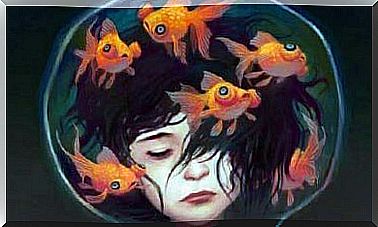When Pain Helps Us Grow

When life is sweet, give thanks and celebrate. When it is bitter, give thanks and grow. This is how Shauna Niequist titled her book Bittersweet. The gratitude for everything that happens to us, whether good or bad, is at the base of the search for fulfillment, for true happiness. Even situations that cause us pain deserve some thanks, as they are the basis of our intellectual, emotional, and spiritual growth.
In fact, pain and bitter experiences are powerful reinforcements to build your deep personal growth. A suffering from which you can initiate transcendental changes to create a better version of yourself. This has a name, it’s called post-traumatic growth.
What is post-traumatic growth
It was psychologists Richard G. Tedeschi and Lawrence G. Calhoun who, in the mid-1990s, originally researched Posttraumatic Growth Inventory (PTGI ). Researchers found that 90% of people who experienced a traumatic event – and the pain that accompanied it – are exposed to at least one factor identified as post-traumatic growth.

This set of circumstances poses great challenges for a person’s adaptive resources and raises important questions about how to understand the world and cope with pain. These circumstances contribute to a profoundly significant personal change process.
The five pillars of PTGI are:
- Desire to be open to new opportunities that weren’t present or didn’t seem possible before.
- A greater sense of connection with others, often reflected in an increase in empathy for the sufferings of others.
- Greater sense of self-sufficiency: If you’ve gotten over it, then you can go beyond anything.
- Increased gratitude for life in general and appreciation for the things that were once taken for granted.
- Deepening in a spiritual connection or purpose, which may include changing beliefs or redefining beliefs.
Causes of post-traumatic growth from pain
Posttraumatic growth occurs with attempts to adapt to highly negative sets of circumstances that can generate high levels of psychological stress. Realities, such as major personal crises, which in the first instance usually generate unpleasant psychological reactions.
Growth is not produced as a direct consequence of trauma, but from the struggle that the individual maintains with the new reality, marked by the trauma’s sequelae. Sequelae that are crucial in determining the degree to which post-traumatic growth occurs.
There are some factors that may be indicative of post-traumatic growth and that are associated with adaptive growth after exposure to trauma. In this sense, it has been shown that spirituality is highly correlated with post-traumatic growth. In fact, many of the most deeply spiritual beliefs are a result of exposure to trauma.
Social support has been well documented as a buffer for mental illness and the stress response. With respect to post-traumatic growth, not only is there a high level of social support prior to growth-associated exposure, but there is also neurobiological evidence that reinforces the idea that social support will shape a possible pathological response to stress.
It has also been found that, in post-traumatic growth, the ability to accept situations that cannot be changed is crucial for adaptation. The conclusion was reached that coming to terms with reality is a significant indicator of post-traumatic growth.

Awakening the superhero within us
We all know stories of people who grew stronger and found a deeper meaning to their existence after a great tragedy. In fact, this is exactly where some of the greatest heroes, both real and fictional, were built.
For example, if we were to make a list of fictional superheroes, surely almost all of us would include Superman, Batman and Spider-Man. These last two, like so many other fictional heroes, establish a crusade against crime when their loved ones or loved ones are murdered. Superman brings another kind of tragedy, but we have a lot more to say about this character if we talk about the story of the actor who played him initially.
Christopher Reeve, the actor who originally played Superman in the movies, became quadriplegic due to a horse accident, a tragedy that made him even consider suicide. Ironies of life. However, that’s when Reeve awakened his true Superman, as with the same determination as his character, he became one of the people who defended and fought for people with spinal cord injuries.
This is just one example of how serious limitation, serious illness, or profound loss can give rise to an inner revolution. This pain-laden earthquake is just the tragic circumstance that takes all the “furniture” out of our head, so that with the new life experience we can put everything back in a much better way.









